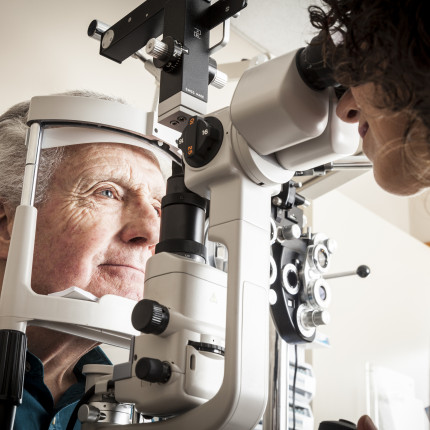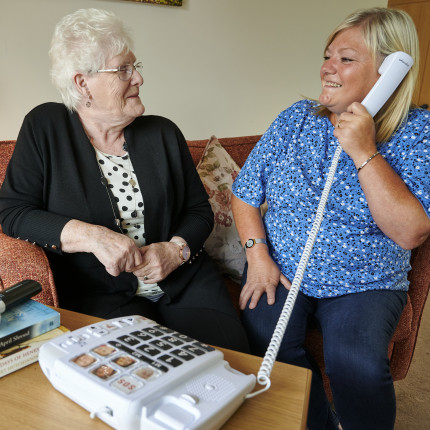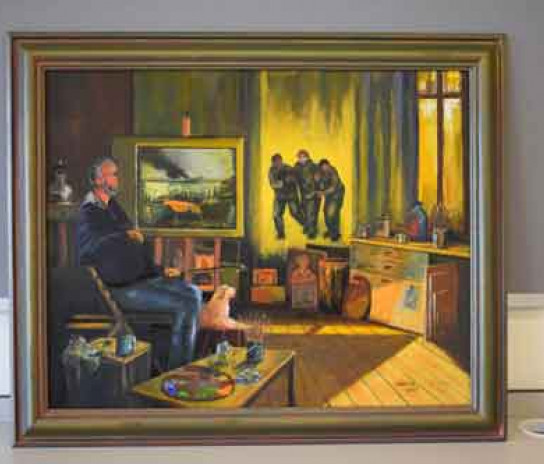“I’m delighted that we’re providing funding to these projects today. Utilising the latest developments in research and clinical care, these initiatives will spur innovation and new techniques to treat veterans - both with physical and mental health conditions - who have been injured in the line of duty.”
Many of the veterans we support at Sight Scotland Veterans are impacted by Charles Bonnet Syndrome (CBS), which causes visual hallucinations and can be very frightening.
Because CBS is so prevalent and distressing, we were pleased to hear that new research is being funded into the effects of the syndrome, and the best ways to support those who experience it.
The Office for Veterans’ Affairs has awarded international research charity BRAVO VICTOR a significant grant for a programme of research into military veterans’ experiences of CBS.
BRAVO VICTOR is Blind Veteran UK's sister charity and aims to accelerate research and innovations by focusing funding, scientists and research organisations on the critical needs of people living with visual impairments and related conditions and disabilities.
The charity fosters research partnerships and collaborations with organisations and individuals recognised for their research excellence.
Charles Bonnet Syndrome is characterised by the presence of visual hallucinations occurring secondary to visual impairment. Typical experiences include transient episodes of simple (i.e., shapes and patterns) or complex (i.e., life-like scenes, animals and people) hallucinations.
Symptoms may persist for many years with the potential to cause significant concern and distress among affected individuals. Evidence suggests CBS is a consequence of deafferentation, whereby diminished sensory input from the eyes results in spontaneous hyper-excitability of the visual cortex, causing hallucinations.
A number of challenges may prevent accurate case finding of CBS. For example, visual hallucinations are associated with many serious illnesses like post-traumatic stress disorder (PTSD), traumatic brain injury, Alzheimer’s and Parkinson’s Disease. Military veterans may have an increased risk of experiencing these underlying conditions and therefore it can be difficult for healthcare providers to identify the casual mechanisms of visual hallucinations when symptoms appear.
Other challenges include an underreporting of the condition due to insufficient awareness and that individuals seldom voluntarily disclose their symptoms due to concerns that hallucinations are indicative of psychiatric illness.
It is hoped this research will improve understanding of visual hallucinations among military veterans by describing the prevalence and phenomenology of CBS among this cohort. In addition, the research will explore referral pathways when military veterans present with visual hallucinations to help identify barriers to accurate diagnosis.
Finally, the impact of a CBS-related intervention will be measured to assess how the well-being and quality of life of individuals living with the condition can be best supported.
The Minister for Veterans’ Affairs Johnny Mercer said:
“I’m delighted that we’re providing funding to these projects today. Utilising the latest developments in research and clinical care, these initiatives will spur innovation and new techniques to treat veterans - both with physical and mental health conditions - who have been injured in the line of duty.”
The research will be led by Professor Renata Gomes and subject matter specialist, Dr Lee Jones, Thomas Pocklington Fellow at BRAVO VICTOR with support from Professor Mariya Moosajee from University College London. Dr Jones has published widely in the area of CBS where his work has received recognition from clinicians and researchers worldwide.

Get free support from our dedicated team

You may also be interested in
Veterans linked to support as experiences of Charles Bonnet Syndrome increase during pandemic
A Sight Scotland Veterans and Esme’s Umbrella telephone support group has supported veterans with sight loss in Scotland who have a little-known condition that results from vision loss and causes visual hallucinations – Charles Bonnet Syndrome (CBS)
Charles Bonnet Syndrome: Marjorie's story
Veteran Marjorie Ramage shares her experiences of little-known condition Charles Bonnet Syndrome, which causes visual, silent hallucinations to occur as a result of sight loss.
Charles Bonnet Syndrome (CBS): Symptoms, Causes and Treatment
Advice on Charles Bonnet Syndrome (CBS), symptoms, and causes. Learn about treatments and coping strategies from our Veterans Rehabilitation Officer.
